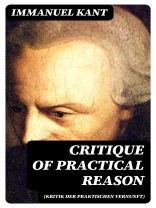Immanuel Kant’s ‘Critique of Practical Reason’ serves as a foundational text in moral philosophy, elucidating his pivotal concepts of duty, moral law, and autonomy. Written in a rigorous and systematic style, this work extends the exploration initiated in his earlier ‘Critique of Pure Reason, ‘ bridging theoretical understanding with practical application. Kant articulates the necessity of a universal moral law grounded in reason, arguing for a categorical imperative that compels individuals to act according to maxims that could be legislated as universal law. Through meticulous analysis and dense argumentation, Kant’s literary form reflects Enlightenment ideals, fostering a discourse that elevates rationality as the essence of ethical principles. Immanuel Kant, a luminary of the Enlightenment, constructed his moral philosophy during a period rife with metaphysical speculation and burgeoning empirical science. His academic journey at the University of Königsberg was marked by intellectual rigor and an unwavering commitment to reason, which propelled him to question the nature of human freedom and moral accountability. The ‘Critique of Practical Reason’ not only builds upon his critical philosophy but also resonates with his life experiences in a rapidly changing world, where the quest for moral certainty became increasingly vital. I highly recommend ‘Critique of Practical Reason’ to readers seeking a profound engagement with ethical reasoning and the role of human agency. Kant’s work challenges us to reconsider our moral responsibilities within the frameworks of rationality and autonomy, making it essential for students of philosophy and anyone invested in understanding the principles underpinning human behavior. His arguments continue to influence contemporary debates in ethics, reinforcing the timelessness of his insights and their applicability to modern moral dilemmas.
Sobre o autor
Immanuel Kant (1724–1804) was a German philosopher who is universally recognized as a central figure in modern philosophy. His comprehensive and systematic work in epistemology, metaphysics, ethics, and aesthetics greatly influenced all subsequent philosophy, often forming the very framework for contemporary debates and research. Born in Königsberg, which is today Kaliningrad, Russia, Kant was the fourth of nine children. Throughout his life, he was an academic and a rigorous thinker. He never traveled far from his hometown, yet his philosophical ideas have traversed the globe. One of his most pivotal works is the ‘Critique of Practical Reason’ (Kritik der praktischen Vernunft, 1788), where he further elaborates on his moral philosophy, which was first introduced in the ‘Groundwork of the Metaphysics of Morals’ (Grundlegung zur Metaphysik der Sitten, 1785), and establishes the concept of the categorical imperative as the fundamental principle of moral law. A defining trait of Kant’s literary style is his dense and complex prose, which is often meticulous and replete with technical terms that he introduced into philosophical discourse. The ‘Critique of Practical Reason’ is integral to Kant’s critical project and is a continuation of his assessment of reason, following the ‘Critique of Pure Reason’ (Kritik der reinen Vernunft, 1781). What distinguishes Kant’s work is his unwavering commitment to the idea of autonomy and the importance of duty, which has left an indelible mark on the field of ethics. His contributions have continued to provoke discussion and inspire thinkers across multiple disciplines, from philosophy to political theory and beyond.












